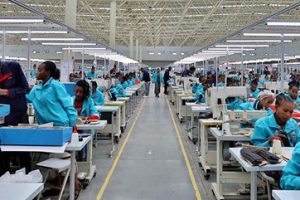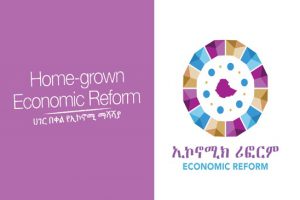The agricultural sector is the mainstay of Ethiopia’s economy. Almost 85 percent of the population ekes out a living from the sector. Yet, the production and farming system of the nation still leans on natural and traditional ways. This notwithstanding, the sector is the major foreign currency earner.
Previously, when a traditional trade system was dominating the market, there was a redundant value chain, which benefited brokers than farmers. Nesanet Tesfaye is Corporate Communication Manager in the Ethiopian Commodity Exchange (ECX).
According to him, bringing into play an easy trade system by applying Information Communication System, ECX is trying its level best to create conducive environment to farmers so that they benefit from the yields they get by the sweat of their brow.
The establishment of ECX’s market years back has flickered rays of hope to poor farmers by warding off problems witnessed in the past. Currently, it is playing a crucial role by shortening the value chain and raising farmers’ bargaining power.
The task of setting the price also takes place through discussion betweenproducers and traders. This enables farmers to sell their products fixing a better price. Nowadays, modern storage facilities are being put in place by cooperative farmers in many parts of the country. It helps farmers not to sell their yields cheaply during harvest seasons usually when price soars up due to excess supply.
Storing for long in addition to keeping the products healthy can serve as a tool for rising farmers’ bargaining power.Farmers, who produce coffee, sesame white and red haricot bean, supply their yields to the market in collaboration with ECX. In addition, this year products such as bean, chickpea, Niger and soybean are expected to get into the modern market chain in such a way the new move could enhance the nation’s foreign currency earning capacity.
Mekonnene Haile Michael is ECX’s Operation Officer. As to him, the task of standardizing, qualifying and supervising products is an international norm. Standardizing serves producers and consumers to reach on a consensus pertaining to setting the price. In addition to these, it serves to brand the product.
In order to earn better income, countries that export agricultural raw materials should emphasize on the qualitative aspect of their products because this helps them to be more competent in the international market.
Years ago, following the break out of cattle diseases in the great east African rift valley regions, some Middle Eastern countries had fight shied from the importation of Ethiopian live animals. After a through negotiation the slackened trade has resumed.
Similarly japan had barred the importation of Ethiopian coffee due to the observance of chemical elements on the coffee bean. Later, the situation was resolved through negotiation.
As agricultural yields are exported in a raw form or with no value addition, they will be exposed to spoilage by cold and rust. Because of these, preserving the produces in modern warehouses and transporting them safely from place-to-place is essential.
Quality helps to exchange commodities based on the international standard. ECX acts in full cognizance of this. Such a move inspires many farmers to join the modern market.
As to Mekonnen, ECX has prioritized to work on yields that promise surpluses. Before bringing products to market based on the rules of the institution, it establishes a surveying technical committee and dispatches it to the farming areas.There, it gathers sample crops and makes feasibility study whether the crop is conducive for modern market or not.
After that, it discusses the matter with relevant stakeholders such as farmers’ associations, seed companies, agricultural researchers and industries which utilize the crop as an input and ultimately after the crop is examined by the laboratory and endorsed by the technicians as good quality, it will get credentials.
The next task of the technical committee is preparing a legal document which serves as money value. It will be provided to the purchaser before s/he receives the purchased crop. When the document is endorsed by the ECX board members, it will be functional.The modern market system enables farmers to join the value chain of the international market.
According to Nasanet, when farmers and traders agree to exchange the commodity, traders deposit the down payment on the farmers’ bank account. Then ECX provides a guarantee. Such a practice makes the trade more realistic.
In the traditional trade system, the transaction between the two was the other way round. First, farmers supply their yields to traders with no guarantee and wait for payment. They had to wait till their products are purchased by traders. Such a situation was very risky. It opened a loophole for fraud.
Some traders breach the agreement and refuse to pay. Ultimately, the situation leaves farmers losers. In the modern system, the ECX branch office inspectors go to areas where the products are produced and inspect the quality, healthiness of the products. They set the standard and provide assurance to farmers.
During the inspection, the identified shortcomings are singled out and sent to the Ministry of Agriculture to be corrected in the next harvesting seasons.For instance the quality of soya bean is categorized in to four making the determination of the price easy. The quality of the product is determined based on how far the yield was protected from spoilage from field to store. The species type of the crop is also considered.
Exporters send the soya bean product to the foreign markets from level one to third.The major importers of Ethiopian soya bean products are India, China, Malyzia and Singapore from Asia. Also Europe and United states belong to the group.
Currently, the rise of demand for soybean in foreign markets has motivated farmers to increase their production. The situation has allowed new opportunity to broaden the nation’s foreign currency earning chance.
The Ethiopian Herald, June 2/2019
BY ABEBE WOLDE GIORGIS





